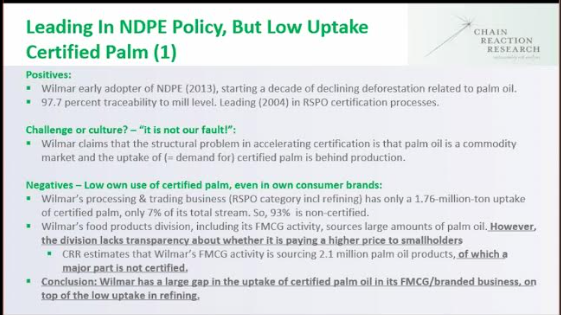|
|
|
Chain Reaction Research Report on Wilmar Shows Challenges for EU Ambitions To Control Deforestation
|
|
|
If you are a consumer in North America or Europe or China and India, there is a good chance that something you consumed today, was supplied by Wilmar International.
Wilmar International Limited is a Singapore-based company, which is engaged in investment holding and the provision of management services. The Company's segments include Food Products, Feed and Industrial Products, Plantation and Sugar Milling and Others. Food Products segment consists of processing, branding and distribution of a range of edible food products, which includes vegetable oil produced from palm and oilseeds, sugar, flour, rice, noodles, specialty fats, snacks, bakery and dairy products. Feed and Industrial Products segment includes processing, merchandising and distribution of products, which includes animal feeds, non-edible palm and lauric products, agricultural commodities, oleochemicals, gas oil and biodiesel. Plantation and Sugar Milling segment consists of oil palm plantation and sugar milling activities, which includes the cultivation and milling of palm oil and sugarcane.
As one of the world’s largest corporations in the food industry, Wilmar has impressive policies on No Deforestation, No Peat, No Exploitation, commonly tagged as NDPE. Wilmar’s report on its NDPE pledges can be read here.
Wilmar International Limited is a Singapore-based company, which is engaged in investment holding and the provision of management services. The Company's segments include Food Products, Feed and Industrial Products, Plantation and Sugar Milling and Others. Food Products segment consists of processing, branding and distribution of a range of edible food products, which includes vegetable oil produced from palm and oilseeds, sugar, flour, rice, noodles, specialty fats, snacks, bakery and dairy products. Feed and Industrial Products segment includes processing, merchandising and distribution of products, which includes animal feeds, non-edible palm and lauric products, agricultural commodities, oleochemicals, gas oil and biodiesel. Plantation and Sugar Milling segment consists of oil palm plantation and sugar milling activities, which includes the cultivation and milling of palm oil and sugarcane.
As one of the world’s largest corporations in the food industry, Wilmar has impressive policies on No Deforestation, No Peat, No Exploitation, commonly tagged as NDPE. Wilmar’s report on its NDPE pledges can be read here.
The paper policies of Wilmar International are so impressive that SPOTT, a rating program operated by the Zoological Society (ZSL) gave it a rating of 91.3% in 2021, with an update coming in November 2022. The SPOTT rating for Wilmar is not expected to change as the corporate policies on deforestation and human rights remain very likeable by those who form opinions based on promises.
As major markets in the EU and US threaten to restrict imports that cause deforestation, paper policies may mean little when these markets demand proof of compliance. More information on the US’s Forest Act can be accessed here. The better known effort to temper deforestation in tropical countries through the EU’s proposed Corporate Due Diligence can be read in this press statement from Fediol.
If the reduction of tropical deforestation is the desired consequence of these legislative actions, the Chain Reaction Research report on Wilmar shows huge gaps that will reduce the desired impact of these legislations.
For one, paper policies that rating groups like SPOTT love, mean little on the ground.
- As CRR revealed, while Wilmar tops the news on NDPE and support for certified sustainable palm oil, the actual corporate support for CSPO, in terms of paying out real money to buy sustainably produced certified palm oil, do not match up.
This should be of concern to financiers who are wont to finance companies, which excel in glossy corporate reports. Corporate reports form the backbone of ESG pledges. These pledges have been so widely abused that there is now, a global crackdown on ESG Greenwash. As the Chain Reaction Research on Wilmar showed, a crackdown is an easy task if one would only count the beans.
For two, the exposure of the weaknesses of Wilmar's policies in preventing deforestation by Chain Reaction Research is bad news for conservation minded policy makers.
- Legislative actions such as those being proposed by the EU and the US to “save forests in producing countries” will not have the desired effect.
- Simple case in point with multinational corporations like Wilmar is that these corporations are more than capable of creating segregated supply chains to meet import requirements. In the case of palm oil for the EU as an example, it should be relatively easy for Wilmar to use controlled supplies of palm oil through its corporate owned plantations to segregate supply for the EU market. However, its large exposure to China, as highlighted by CRR, means that the rest of the company’s operations could be profiting off deforestation.
When the causes of deforestation run from coffee to beef and palm oil across many different countries, how will the EU or US react to the fact that the same company that supplies them with sustainable commodities is selling deforestation to other markets? This is especially relevant for multi-national companies like Wilmar whose operations are global, includes other oilseeds in soy, rapeseed, sunflower with little accounting for their sustainability.
Certification of supply chains is obviously the only viable solution for the EU or US to assure their citizens that imported goods are not harming forests in other countries. Thanks to the focus on palm oil by environmental groups, the global palm oil industry stands most ready to meet the requirements of the EU and the US. But the global palm oil industry maybe denied easy entry into these markets despite its leading status as a certified commodity. Read Deforestation-Free Palm Oil Supply Chain Ready For The EU to understand why
Published July 2022. CSPO Watch
|
|
|

